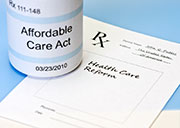- Double Mastectomy May Offer No Survival Benefit to Women With Breast Cancer
- Toxic Lead Found in Cinnamon Product, FDA Says
- Certain Abbott Blood Sugar Monitors May Give Incorrect Readings
- Athletes Can Expect High Ozone, Pollen Counts for Paris Olympics
- Fake Oxycontin Pills Widespread and Potentially Deadly: Report
- Shingles Vaccine Could Lower Dementia Risk
- Your Odds for Accidental Gun Death Rise Greatly in Certain States
- Kids From Poorer Families Less Likely to Survive Cancer
- Tough Workouts Won’t Trigger Cardiac Arrest in Folks With Long QT Syndrome
- At-Home Colon Cancer Test Can Save Lives
2.6 Million ‘Inconsistencies’ in Federal Insurance Applications


Two new U.S. reports suggest it’s possible that people who signed up for health insurance under the Affordable Care Act on the federal government’s health care website — or state websites in California and Connecticut — may not have been eligible for that coverage, according to published reports.
Or, they may not have been eligible to receive federal subsidies that assist in paying for insurance coverage, the reports said.
The reports were issued by the U.S. Department of Health and Human Services’ Office of Inspector General. They cited concerns over “internal controls” for verifying Social Security numbers, citizenship status and a person’s eligibility to purchase health insurance through the insurance websites, or exchanges, according to the Washington Post.
One of the reports found that the federal marketplace couldn’t resolve more than 2.6 million of nearly 3 million “inconsistencies” found between federal records and documentation provided by insurance applicants. However, the report noted that an inconsistency doesn’t necessarily mean someone provided inaccurate information.
Republicans were quick to point to what they called flaws in the online insurance marketplaces, which are an integral part of the Affordable Care Act. The Obama administration has “allowed millions of Americans to enroll in a system that may be handing them the wrong subsidies — too much or too little — and they’ve left taxpayers vulnerable to fraud,” Sen. Lamar Alexander, R-Tenn., said in a statement published by the newspaper.
Sen. Tom Harkin, D-Iowa, chairman of the Senate Health, Education, Labor, and Pensions Committee, countered that the administration has been “already improving marketplace operations” and said that, after a troubled beginning, the federal exchange has been “a genuine success.”
Both reports were based on the marketplaces’ records from October through December of last year. That was the first half of the initial six-month signup period for insurance under the health-care law, sometimes called Obamacare, the Post reported.
The first signup period ended March 31. The initial phases of the first signup period were marred by major computer glitches. They were largely fixed during the second three months of the Oct. 1-March 31 signup period.
A spokesman for the U.S. Centers for Medicare and Medicaid Services (CMS) said the fact that the insurance enrollment system had flaws early on isn’t news. “We’ve come a long way since then,” Aaron Albright told the Post.
Albright added that CMS “is working expeditiously to resolve inconsistencies to make sure individuals and families get the tax credits and coverage they deserve and that no one receives a benefit they shouldn’t.”
More information
To learn more about the Affordable Care Act, visit the U.S. Department of Health and Human Services.
Source: HealthDay
Copyright © 2024 HealthDay. All rights reserved.










